Advisor, Michigan-China Innovation Center
As of last month, Zhong Shanshan, founder of the popular Chinese bottled water brand Nongfu Spring, has overtaken Alibaba founder Jack Ma to become the country’s wealthiest person, according to the Bloomberg News Service.
With earnings of $58.7 bn (US), Mr. Zhong now ranks 17th overall on Bloomberg’s list of the world’s top 500 richest people. He also owns the controlling stake in Beijing Wantai Biological Pharmacy Enterprise, a pharma firm that partnered with two research universities to develop a candidate vaccine to fight Covid-19.
The Potential of Wealth
In our world today, wealth brings power along with the potential to change the world.
This was certainly true of the Chinese Communist Party. Deng Xiaoping, following his predecessor, Mao Tse Tung, pulled China back from the twin disasters of the Cultural Revolution and the Great Leap Forward, opening China to the world.
No stranger to revolution himself – he was, after all, with Mao every step of the way during China’s Long March and revolutionary struggle for China in the 1930s – when it was his turn, he unleashed his own revolution of change and progress for China. Deng was nothing if not tenacious and persistent. Yet, the central element in Deng’s approach throughout his life was pragmatism and finding a way to accomplish results. He was also no stranger to adversity. It is said that Deng was knocked down and exiled 3 times by Mao only to rise and contribute again and again.
After Chairman Mao Zedong’s death in 1976, Deng gradually came to power and orchestrated China’s rise through a series of drastic market economy reforms which earned him the reputation as the “Architect of Modern China”. His reforms are credited with “opening to the world” and more importantly, to foreign direct investment, lowering and eliminating other trade barriers that catapulted China forward.
Perhaps one of China’s most amazing and significant accomplishments is the quest for and success in combating extreme poverty and hunger. It is estimated that up to 800 million people have escaped abject poverty and moved into the Chinese middle class due to Deng’s reforms. Chinese people living in poverty dropped from 88 percent in 1981 to 6 percent in 2017.
Imagine moving twice the population of the U.S. from extreme poverty to a decent standard of living in less than 50 years. This is perhaps not only China’s but one of the world’s greatest success stories. Deng’s reforms made China fertile ground within which to shed Mao’s straight jacket of past ideological constraints.
China in Transition
I recall walking in a market in Shaoshan, Hunan (Mao’s hometown) in the early 2000s when a woman speaking Mandarin frantically grabbed my arm and motioned me to follow her. We weaved through the market and down various alleyways, finally arriving at the excited woman’s stall. She flipped through a catalog, jabbing her finger at the pages. I broke into laughter realizing she was an Amway distributor, attempting to hawk her “American Way” products in the birthplace of the Mao – founder of the Chinese Communist Party.
Change and Progress
Deng proclaimed, “To get rich is glorious” and people took him at his word. He remains revered in China today as an architect of the Chinese economic miracle. Deng Xiaoping’s thought – and theory behind “socialism with Chinese characteristics” – is captured in his quote, “It doesn’t matter whether a cat is black or white, as long as it catches mice.”
Deng’s actions, prophetic to China’s 21st-century economic turnaround, catapulted China into global superpower status economically, militarily, and politically, putting into play something both remarkable and universally acknowledged: China’s true revolution is in regaining its wealth and power, lost to the West centuries before.
Deng’s words came flooding back to me as I reflect on just how far China has come since its century of humiliation in 1849. From my mother telling me in the 1960s to “eat my vegetables, children in China are starving,” to China’s producing more billionaires than India and the USA combined. China’s meteoric rise has been extraordinary with the expectation that the world’s largest Communist country is now poised to overtake the United States as the world’s largest economy.
Now What?
Having wealth provides choices that few, if any, of China’s new billionaires ever dreamed of. Like China itself and China’s Communist Party leaders under current Chairman Xi Jinping, they will have some consequential decisions to make about how they will invest in China’s wealth.
President Xi seems to want China to reclaim its mantle of being a top superpower, the regaining wealth and world power it lost centuries before. China has invested in eliminating poverty, building its infrastructure (air and seaports, rail, roads, bridges), education, and technology, especially 5G bandwidth. Artificial intelligence and big data support its domestic industries as well as its military and internal domestic security. Budgets are statements of priorities and the world can see where China is headed as it invests the globalization gains it has accumulated.
China’s Billionaires
Today, Zhong Shanshan stands as China’s richest person. His controlling stake in Beijing Wantai Biological Pharmacy Enterprise caused his overall wealth jump nearly $20bn earlier this year. Clearly, his wealth could expand tenfold should they be successful in producing a COVID-19 vaccine. A vaccine used solely in China has a potential for 1.4 billion customers.
According to the Hurun Report’s Global Rich List 2020, China now has 799 billionaires. Where will these new super rich invest their fortunes going forward? Many are investing in their own children sending them to the finest international prep schools and Ivy League Universities according to the South China Morning Post.
Yes, to get rich is glorious. To spend that wealth to provide opportunities for children and others is a noble pursuit. Yet, more can and should be done.
China would be wise to build on the goodwill younger people in America have towards China. According to a recent Pew survey, younger people in the United States often have more positive views of all foreign countries and institutions than their elders. Millennials (32%) see China in a more positive light than do Gen Xers (23%) or Boomers (21%).
Given the tensions today between China and the U.S., and with an increasing number of other Western nations, a good use of the Chinese billionaires’ wealth would be to work with their Western counterparts in building student-to-student learning opportunities at the middle and high school levels. Lay a foundation of mutual understanding and knowledge that may keep the peace and create economic, social, cultural, scientific, and educational connections. This could be the bond that will help solve the most vexing problems in the world.
I laid out one such idea on these pages previously. I can think of no better way to invest the fortunes gained than in our shared humanity and a nation’s youth. Young people make up a small percentage of our respective populations—but they are 100% of our collective future.
To get rich is glorious.
To help change the world as Deng Xiaoping did by investing in youth? Now that would be priceless.
Source: To Get Rich Is Glorious! – Tom Watkins – CHINA US Focus
























